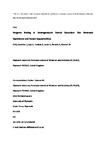Progress testing in undergraduate dental education: the Peninsula experience and future opportunities
| dc.contributor.author | Ali, K | |
| dc.contributor.author | Coombes, L | |
| dc.contributor.author | Kay, E | |
| dc.contributor.author | Tredwin, C | |
| dc.contributor.author | Jones, G | |
| dc.contributor.author | Ricketts, C | |
| dc.contributor.author | Bennett, J | |
| dc.date.accessioned | 2015-12-14T09:57:23Z | |
| dc.date.accessioned | 2016-08-02T12:00:14Z | |
| dc.date.accessioned | 2016-08-02T12:02:26Z | |
| dc.date.available | 2015-12-14T09:57:23Z | |
| dc.date.issued | 2016-07-11 | |
| dc.identifier.issn | 1600-0579 | |
| dc.identifier.issn | 1600-0579 | |
| dc.identifier.uri | http://hdl.handle.net/10026.1/5162 | |
| dc.description | keywords: assessment, longitudinal, dental, progress testing | |
| dc.description.abstract |
Background Progress testing is well established as a longitudinal form of assessment in undergraduate medical programmes to measure growth in knowledge. Peninsula Dental School is the first school to use progress testing and remains the only one to do so. Aims To share the experience of developing progress testing in an undergraduate dental programme as a major summative assessment tool at a newly established dental school in the United Kingdom. Methods Data were collected for progress tests conducted from 2007 to 14. The tests were formative in the first 2 years of the programme and summative in subsequent years. Each test was based on 100 single best answer multiple-choice items with an appropriate vignette. The students chose their answer from 5 options. A score 1 mark is awarded for each correct answer, minus 0.25 for an incorrect answer and 0 for ‘don’t know’ (DK). The standard setting for each sitting was carried out using Angoff and Hofstee methods. Results There were two tests per year with each cohort undertaking eight tests in their 4 years of study providing a total 14 test occasions. The reliability of each test for each student cohort tests was measured using Cronbach’s alpha. The average reliability over 42 test/cohort combinations was 0.753 (±SD 0.08). Data analyses show growth in knowledge of dental students across successive years with the largest increase in knowledge observed between tests 1 and 5 and concomitant reduction in DK responses. Conclusion This is the first study to report the establishment and use of progress testing as the principle form of written summative testing in an undergraduate dental curriculum. Progress testing is a valid and reliable tool to assess growth in knowledge longitudinally over the duration of a dental programme. Although a labour-intensive process, progress testing merits more widespread use in dental programmes. | |
| dc.format.extent | 129-134 | |
| dc.format.medium | Print-Electronic | |
| dc.language | en | |
| dc.language.iso | en | |
| dc.publisher | Wiley | |
| dc.relation.replaces | http://hdl.handle.net/10026.1/3947 | |
| dc.relation.replaces | 10026.1/3947 | |
| dc.relation.replaces | http://hdl.handle.net/10026.1/5161 | |
| dc.relation.replaces | 10026.1/5161 | |
| dc.subject | assessment | |
| dc.subject | longitudinal | |
| dc.subject | dental | |
| dc.subject | progress testing | |
| dc.title | Progress testing in undergraduate dental education: the Peninsula experience and future opportunities | |
| dc.type | journal-article | |
| dc.type | article | |
| plymouth.author-url | https://www.ncbi.nlm.nih.gov/pubmed/25874344 | |
| plymouth.issue | 3 | |
| plymouth.volume | 20 | |
| plymouth.publisher-url | http://dx.doi.org/10.1111/eje.12149 | |
| plymouth.publication-status | Published | |
| plymouth.journal | European Journal of Dental Education | |
| dc.identifier.doi | 10.1111/eje.12149 | |
| plymouth.organisational-group | /Plymouth | |
| plymouth.organisational-group | /Plymouth/Faculty of Health | |
| plymouth.organisational-group | /Plymouth/Faculty of Health/Peninsula Dental School | |
| plymouth.organisational-group | /Plymouth/REF 2021 Researchers by UoA | |
| plymouth.organisational-group | /Plymouth/REF 2021 Researchers by UoA/UoA03 Allied Health Professions, Dentistry, Nursing and Pharmacy | |
| plymouth.organisational-group | /Plymouth/Research Groups | |
| plymouth.organisational-group | /Plymouth/Research Groups/Institute of Health and Community | |
| plymouth.organisational-group | /Plymouth/Research Groups/Institute of Translational and Stratified Medicine (ITSMED) | |
| plymouth.organisational-group | /Plymouth/Research Groups/Institute of Translational and Stratified Medicine (ITSMED)/CCT&PS | |
| plymouth.organisational-group | /Plymouth/Users by role | |
| plymouth.organisational-group | /Plymouth/Users by role/Academics | |
| dc.publisher.place | England | |
| dcterms.dateAccepted | 2015-03-16 | |
| dc.rights.embargodate | 2017-7-11 | |
| dc.identifier.eissn | 1600-0579 | |
| dc.rights.embargoperiod | Not known | |
| rioxxterms.versionofrecord | 10.1111/eje.12149 | |
| rioxxterms.licenseref.uri | http://www.rioxx.net/licenses/all-rights-reserved | |
| rioxxterms.licenseref.startdate | 2016-07-11 | |
| rioxxterms.type | Journal Article/Review |


